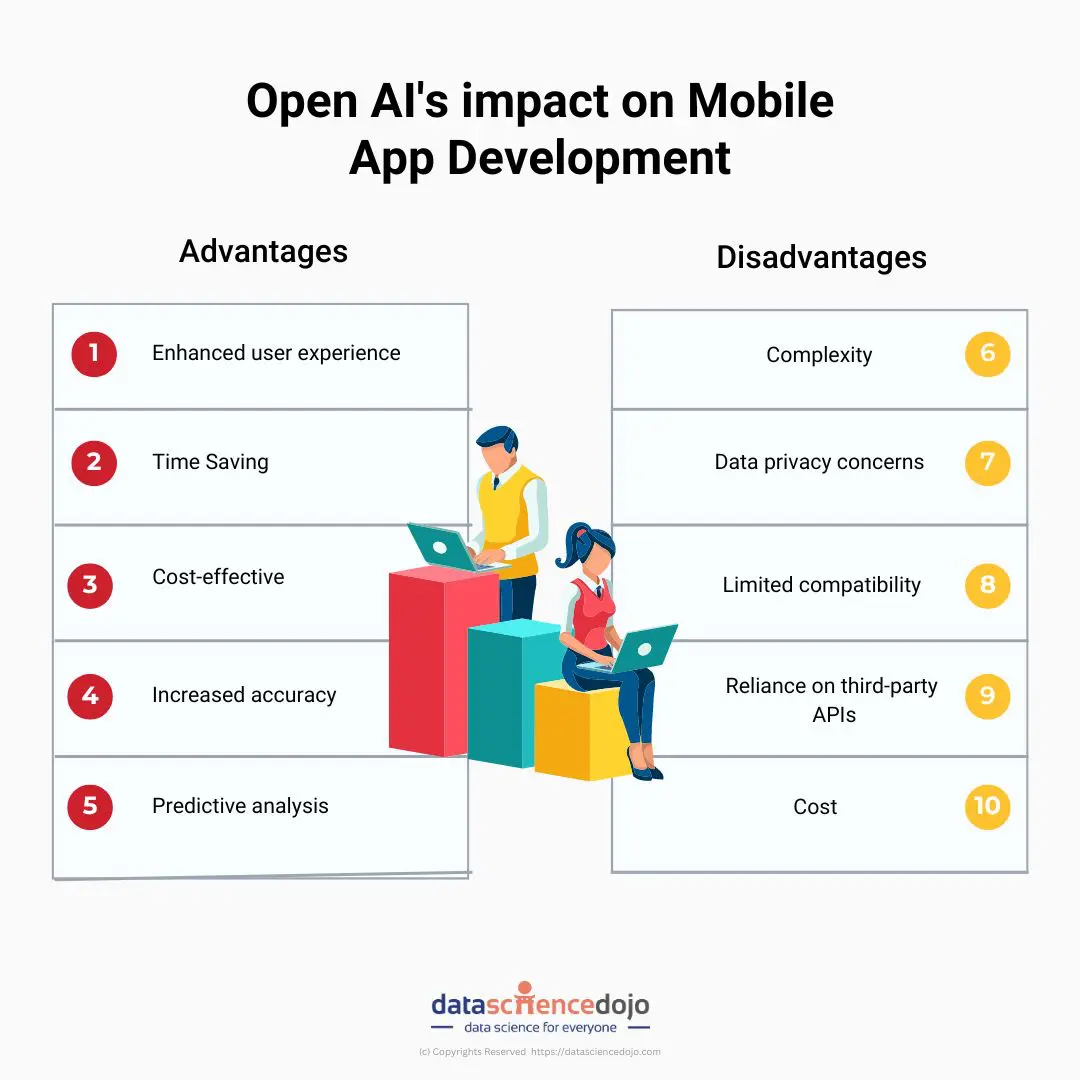OpenAI is a research company that specializes in artificial intelligence (AI) and machine learning (ML) technologies. Its goal is to develop safe AI systems that can benefit humanity as a whole. OpenAI offers a range of AI and ML tools that can be integrated into mobile app development, making it easier for developers to create intelligent and responsive apps.
The purpose of this blog post is to discuss the advantages and disadvantages of using OpenAI in mobile app development. We will explore the benefits and potential drawbacks of OpenAI in terms of enhanced user experience, time-saving, cost-effectiveness, increased accuracy, and predictive analysis.
How OpenAI works in mobile app development?
OpenAI provides developers with a range of tools and APIs that can be used to incorporate AI and ML into their mobile apps. These tools include natural language processing (NLP), image recognition, predictive analytics, and more.
OpenAI’s NLP tools can help improve the user experience by providing personalized recommendations, chatbot functionality, and natural language search capabilities. Image recognition tools can be used to identify objects, people, and places within images, enabling developers to create apps that can recognize and respond to visual cues.
OpenAI’s predictive analytics tools can analyze data to provide insights that can be used to enhance user engagement. For example, predictive analytics can be used to identify which users are most likely to churn and to provide targeted offers or promotions to those users.
OpenAI’s machine learning algorithms can also automate certain tasks, such as image or voice recognition, allowing developers to focus on other aspects of the app.

Advantages of using OpenAI in mobile app development
1. Enhanced user experience:
OpenAI can help improve the user experience by providing personalized recommendations, chatbot functionality, and natural language search capabilities. For instance, using OpenAI algorithms, a mobile app can analyze user data to provide tailored recommendations, making the user experience more intuitive and enjoyable. Additionally, OpenAI can enhance the user interface of an app by providing natural language processing that allows users to interact with the app using their voice or text. This feature can make apps more accessible to people with disabilities or those who prefer not to use touch screens.
2. Time-saving:
OpenAI’s machine learning algorithms can automate certain tasks, such as image or voice recognition, which can save developers time and effort. This allows developers to focus on other aspects of the app, such as design and functionality. For instance, using OpenAI image recognition, a mobile app can automatically tag images uploaded by users, which saves time for both the developer and the user.
3. Cost-effective:
OpenAI can reduce development costs by automating tasks that would otherwise require manual labor. This can be particularly beneficial for smaller businesses that may not have the resources to hire a large development team. Additionally, OpenAI provides a range of pre-built tools and APIs that developers can use to create apps quickly and efficiently.
4. Increased accuracy:
OpenAI algorithms can perform complex calculations with a higher level of accuracy than humans. This can be particularly useful for tasks such as predictive analytics or image recognition, where accuracy is essential. For example, using OpenAI predictive analytics, a mobile app can analyze user data to predict which products a user is likely to buy, enabling the app to provide personalized offers or promotions.
5. Predictive analysis:
OpenAI’s predictive analytics tools can analyze data and provide insights that can be used to enhance user engagement. For example, predictive analytics can be used to identify which users are most likely to churn and to provide targeted offers or promotions to those users. Additionally, OpenAI can be used to analyze user behavior to identify patterns and trends that can inform app development decisions.
Disadvantages of using OpenAI in mobile app development:
1. Complexity:
Integrating OpenAI into mobile app development can be complex and time-consuming. Developers need to have a deep understanding of AI and machine learning concepts to create effective algorithms. Additionally, the integration process can be challenging, as developers need to ensure that OpenAI is compatible with the app’s existing infrastructure.
2. Data privacy concerns:
OpenAI relies on data to learn and make predictions, which can raise privacy concerns. Developers need to ensure that user data is protected and not misused. Additionally, OpenAI algorithms can create bias if the data used to train them is not diverse or representative. This can lead to unfair or inaccurate predictions.
3. Limited compatibility:
OpenAI may not be compatible with all mobile devices or operating systems. This can limit the number of users who can use the app and affect its popularity. Developers need to ensure that OpenAI is compatible with the target devices and operating systems before integrating it into the app.
4. Reliance on third-party APIs:
OpenAI may rely on third-party APIs, which can affect app performance and security. Developers need to ensure that these APIs are reliable and secure, as they can be a potential vulnerability in the app’s security. Additionally, the performance of the app can be affected if the third-party APIs are not optimized.
5. Cost:
Implementing OpenAI into mobile app development can be expensive, especially for smaller businesses. Developers need to consider the cost of developing and maintaining the AI algorithms, as well as the cost of integrating and testing them. Additionally, OpenAI may require additional hardware or infrastructure to run effectively, which can further increase costs.
Wrapping up
It is essential for developers to carefully consider these factors before implementing OpenAI into mobile app development.
For developers who are considering using OpenAI in their mobile apps, we recommend conducting thorough research into the AI algorithms and their potential impact on the app. It may also be helpful to seek guidance from AI experts or consultants to ensure that the integration process is smooth and successful.
In conclusion, while OpenAI can be a powerful tool for enhancing mobile app functionality and user experience, developers must carefully consider its advantages and disadvantages before integrating it into their apps. By doing so, they can create more intelligent and responsive apps that meet the needs of their users, while also ensuring the app’s security, privacy, and performance.




